Unit 43: Tapping into New and International Markets for HSBC
VerifiedAdded on 2023/06/08
|8
|1983
|342
Report
AI Summary
This report provides a comprehensive analysis of HSBC's global expansion strategy, with a specific focus on the London, United Kingdom market. It begins with an introduction to London's business environment and the factors influencing HSBC's operations. The report then delves into a critical analysis of the global business environment, key global drivers such as consumer behavior and technology, and the rationale for SMEs to expand internationally. It explores the opportunities and challenges associated with global growth, followed by an evaluation of trading blocs and agreements, particularly the EU-UK Trade and Cooperation Agreement. The report concludes with an assessment of how trading blocs generate global growth. The report is supported by references to academic journals and books, providing a well-rounded perspective on HSBC's international market strategies.
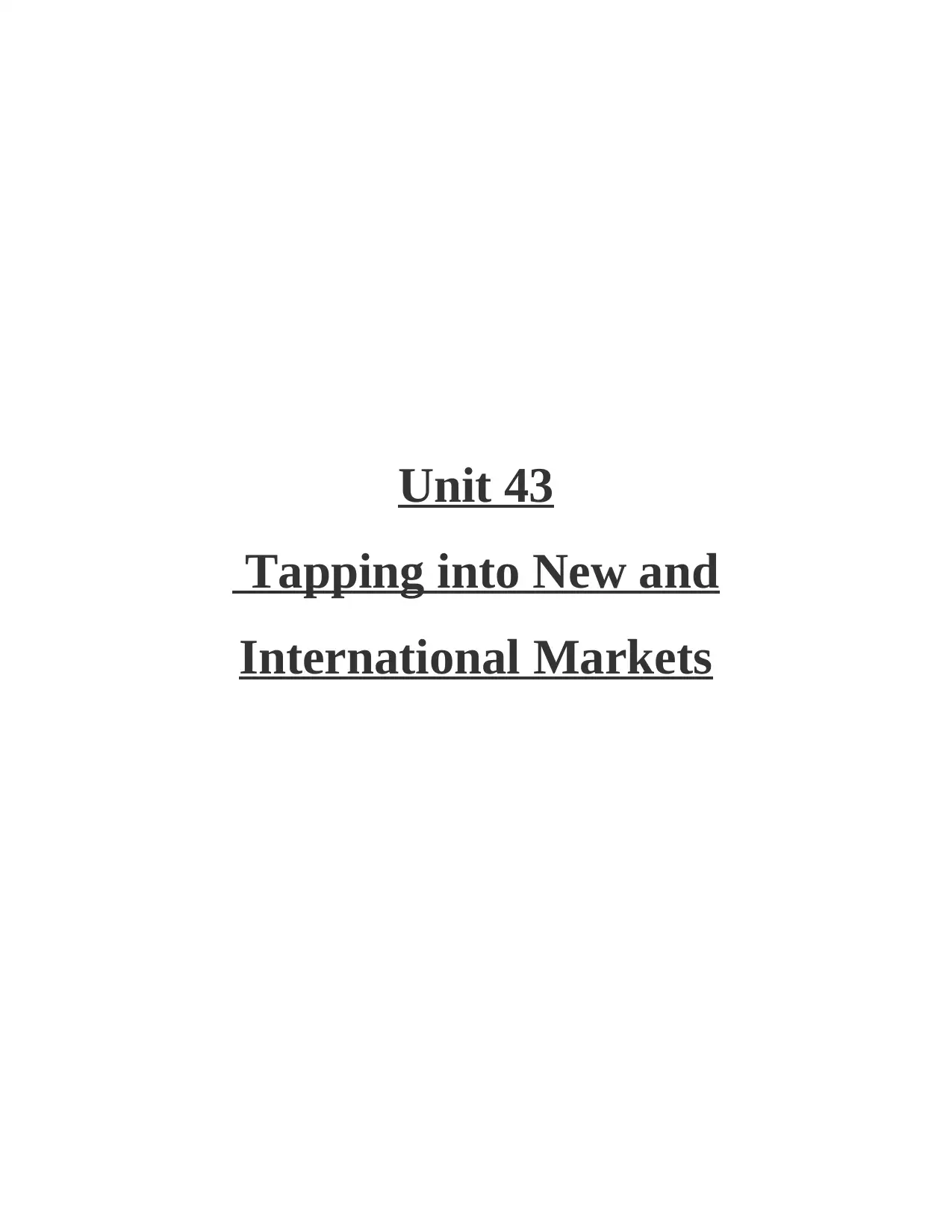
Unit 43
Tapping into New and
International Markets
Tapping into New and
International Markets
Paraphrase This Document
Need a fresh take? Get an instant paraphrase of this document with our AI Paraphraser
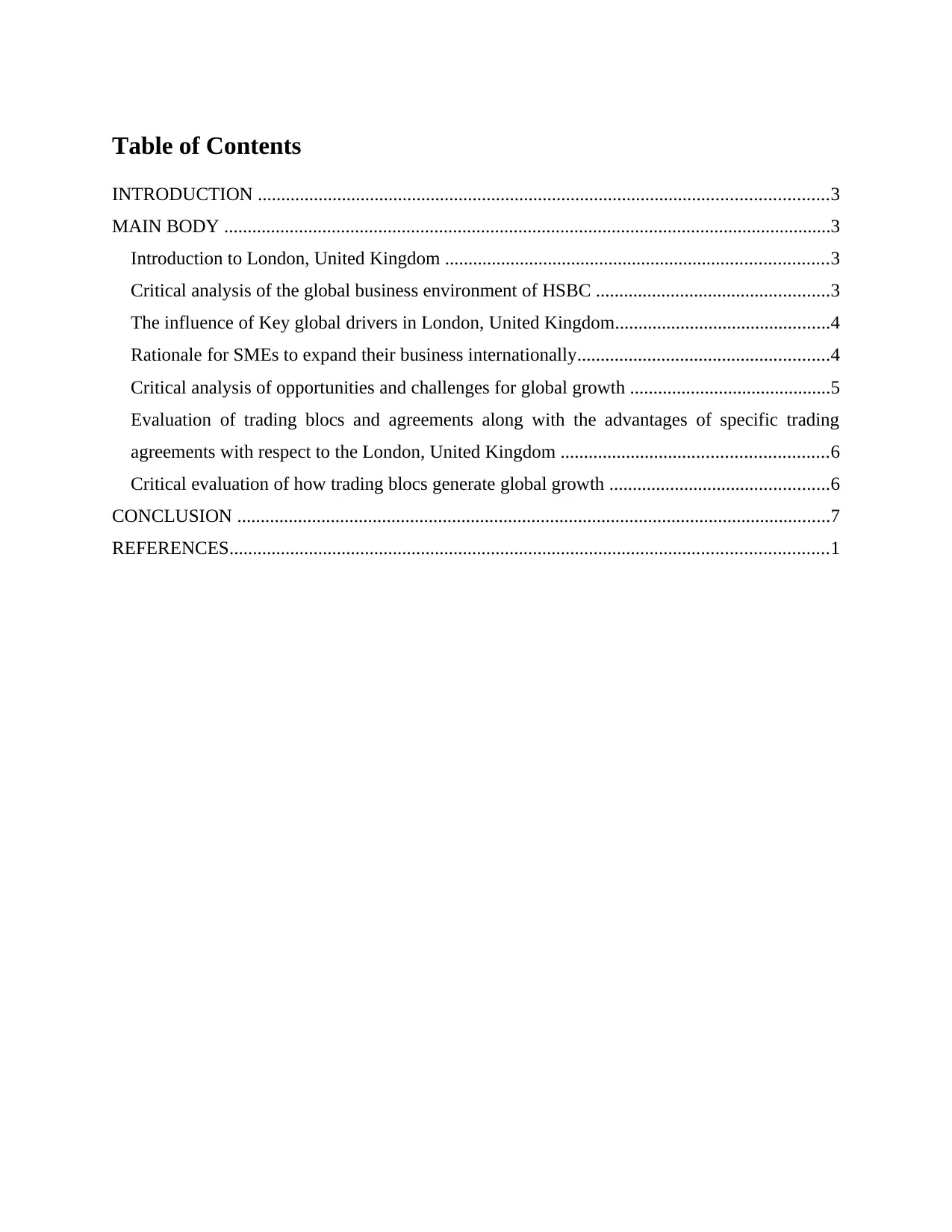
Table of Contents
INTRODUCTION ..........................................................................................................................3
MAIN BODY ..................................................................................................................................3
Introduction to London, United Kingdom ..................................................................................3
Critical analysis of the global business environment of HSBC ..................................................3
The influence of Key global drivers in London, United Kingdom..............................................4
Rationale for SMEs to expand their business internationally......................................................4
Critical analysis of opportunities and challenges for global growth ...........................................5
Evaluation of trading blocs and agreements along with the advantages of specific trading
agreements with respect to the London, United Kingdom .........................................................6
Critical evaluation of how trading blocs generate global growth ...............................................6
CONCLUSION ...............................................................................................................................7
REFERENCES................................................................................................................................1
INTRODUCTION ..........................................................................................................................3
MAIN BODY ..................................................................................................................................3
Introduction to London, United Kingdom ..................................................................................3
Critical analysis of the global business environment of HSBC ..................................................3
The influence of Key global drivers in London, United Kingdom..............................................4
Rationale for SMEs to expand their business internationally......................................................4
Critical analysis of opportunities and challenges for global growth ...........................................5
Evaluation of trading blocs and agreements along with the advantages of specific trading
agreements with respect to the London, United Kingdom .........................................................6
Critical evaluation of how trading blocs generate global growth ...............................................6
CONCLUSION ...............................................................................................................................7
REFERENCES................................................................................................................................1
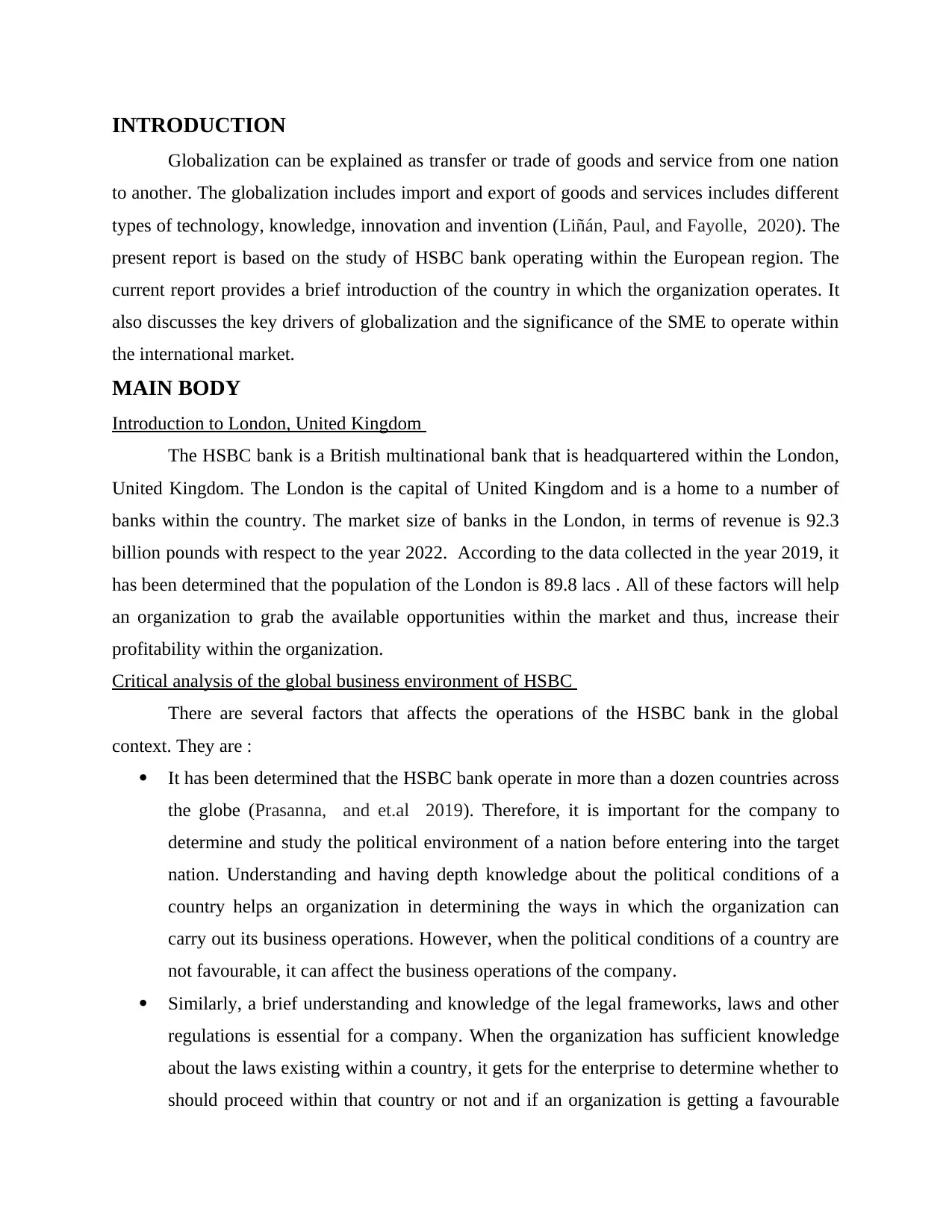
INTRODUCTION
Globalization can be explained as transfer or trade of goods and service from one nation
to another. The globalization includes import and export of goods and services includes different
types of technology, knowledge, innovation and invention (Liñán, Paul, and Fayolle, 2020). The
present report is based on the study of HSBC bank operating within the European region. The
current report provides a brief introduction of the country in which the organization operates. It
also discusses the key drivers of globalization and the significance of the SME to operate within
the international market.
MAIN BODY
Introduction to London, United Kingdom
The HSBC bank is a British multinational bank that is headquartered within the London,
United Kingdom. The London is the capital of United Kingdom and is a home to a number of
banks within the country. The market size of banks in the London, in terms of revenue is 92.3
billion pounds with respect to the year 2022. According to the data collected in the year 2019, it
has been determined that the population of the London is 89.8 lacs . All of these factors will help
an organization to grab the available opportunities within the market and thus, increase their
profitability within the organization.
Critical analysis of the global business environment of HSBC
There are several factors that affects the operations of the HSBC bank in the global
context. They are :
It has been determined that the HSBC bank operate in more than a dozen countries across
the globe (Prasanna, and et.al 2019). Therefore, it is important for the company to
determine and study the political environment of a nation before entering into the target
nation. Understanding and having depth knowledge about the political conditions of a
country helps an organization in determining the ways in which the organization can
carry out its business operations. However, when the political conditions of a country are
not favourable, it can affect the business operations of the company.
Similarly, a brief understanding and knowledge of the legal frameworks, laws and other
regulations is essential for a company. When the organization has sufficient knowledge
about the laws existing within a country, it gets for the enterprise to determine whether to
should proceed within that country or not and if an organization is getting a favourable
Globalization can be explained as transfer or trade of goods and service from one nation
to another. The globalization includes import and export of goods and services includes different
types of technology, knowledge, innovation and invention (Liñán, Paul, and Fayolle, 2020). The
present report is based on the study of HSBC bank operating within the European region. The
current report provides a brief introduction of the country in which the organization operates. It
also discusses the key drivers of globalization and the significance of the SME to operate within
the international market.
MAIN BODY
Introduction to London, United Kingdom
The HSBC bank is a British multinational bank that is headquartered within the London,
United Kingdom. The London is the capital of United Kingdom and is a home to a number of
banks within the country. The market size of banks in the London, in terms of revenue is 92.3
billion pounds with respect to the year 2022. According to the data collected in the year 2019, it
has been determined that the population of the London is 89.8 lacs . All of these factors will help
an organization to grab the available opportunities within the market and thus, increase their
profitability within the organization.
Critical analysis of the global business environment of HSBC
There are several factors that affects the operations of the HSBC bank in the global
context. They are :
It has been determined that the HSBC bank operate in more than a dozen countries across
the globe (Prasanna, and et.al 2019). Therefore, it is important for the company to
determine and study the political environment of a nation before entering into the target
nation. Understanding and having depth knowledge about the political conditions of a
country helps an organization in determining the ways in which the organization can
carry out its business operations. However, when the political conditions of a country are
not favourable, it can affect the business operations of the company.
Similarly, a brief understanding and knowledge of the legal frameworks, laws and other
regulations is essential for a company. When the organization has sufficient knowledge
about the laws existing within a country, it gets for the enterprise to determine whether to
should proceed within that country or not and if an organization is getting a favourable
⊘ This is a preview!⊘
Do you want full access?
Subscribe today to unlock all pages.

Trusted by 1+ million students worldwide
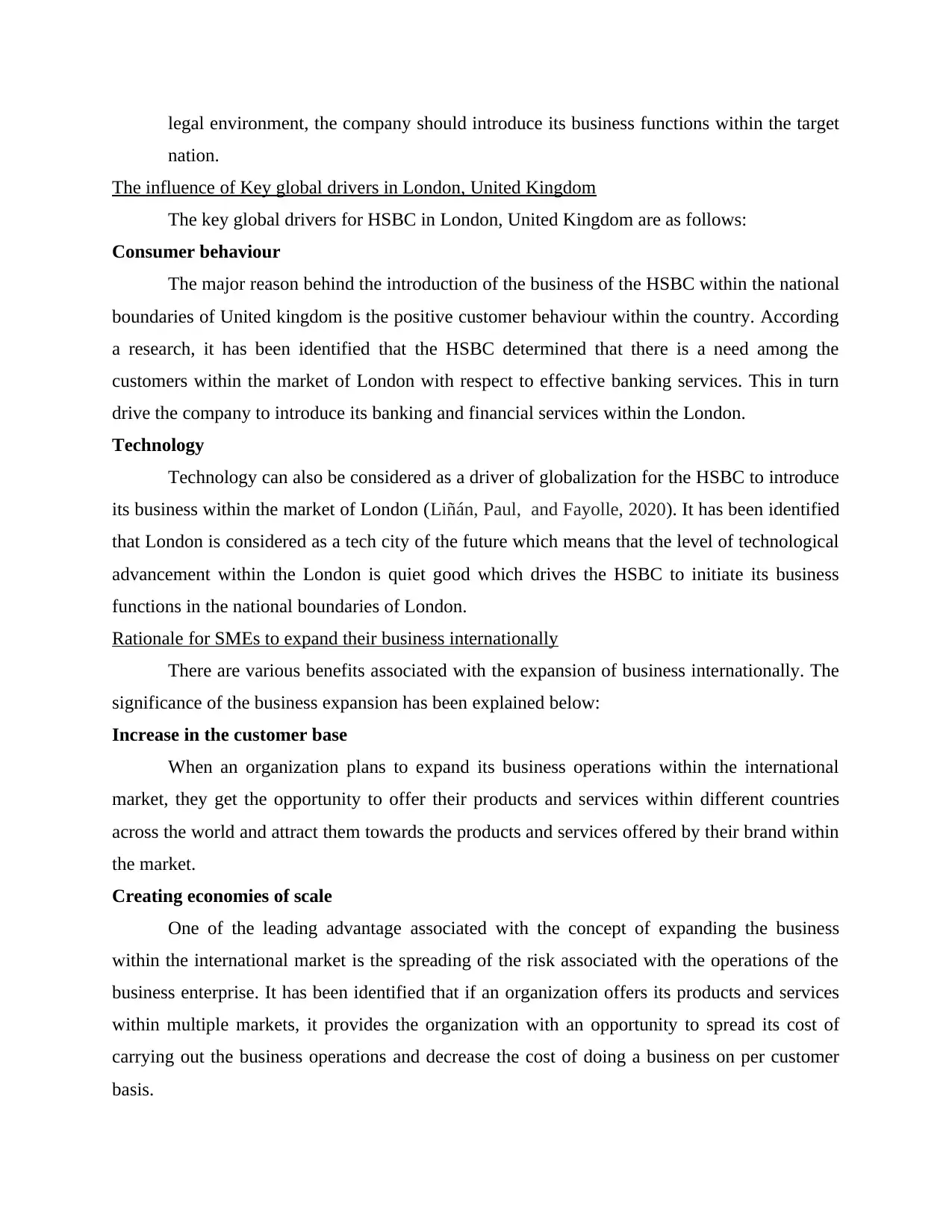
legal environment, the company should introduce its business functions within the target
nation.
The influence of Key global drivers in London, United Kingdom
The key global drivers for HSBC in London, United Kingdom are as follows:
Consumer behaviour
The major reason behind the introduction of the business of the HSBC within the national
boundaries of United kingdom is the positive customer behaviour within the country. According
a research, it has been identified that the HSBC determined that there is a need among the
customers within the market of London with respect to effective banking services. This in turn
drive the company to introduce its banking and financial services within the London.
Technology
Technology can also be considered as a driver of globalization for the HSBC to introduce
its business within the market of London (Liñán, Paul, and Fayolle, 2020). It has been identified
that London is considered as a tech city of the future which means that the level of technological
advancement within the London is quiet good which drives the HSBC to initiate its business
functions in the national boundaries of London.
Rationale for SMEs to expand their business internationally
There are various benefits associated with the expansion of business internationally. The
significance of the business expansion has been explained below:
Increase in the customer base
When an organization plans to expand its business operations within the international
market, they get the opportunity to offer their products and services within different countries
across the world and attract them towards the products and services offered by their brand within
the market.
Creating economies of scale
One of the leading advantage associated with the concept of expanding the business
within the international market is the spreading of the risk associated with the operations of the
business enterprise. It has been identified that if an organization offers its products and services
within multiple markets, it provides the organization with an opportunity to spread its cost of
carrying out the business operations and decrease the cost of doing a business on per customer
basis.
nation.
The influence of Key global drivers in London, United Kingdom
The key global drivers for HSBC in London, United Kingdom are as follows:
Consumer behaviour
The major reason behind the introduction of the business of the HSBC within the national
boundaries of United kingdom is the positive customer behaviour within the country. According
a research, it has been identified that the HSBC determined that there is a need among the
customers within the market of London with respect to effective banking services. This in turn
drive the company to introduce its banking and financial services within the London.
Technology
Technology can also be considered as a driver of globalization for the HSBC to introduce
its business within the market of London (Liñán, Paul, and Fayolle, 2020). It has been identified
that London is considered as a tech city of the future which means that the level of technological
advancement within the London is quiet good which drives the HSBC to initiate its business
functions in the national boundaries of London.
Rationale for SMEs to expand their business internationally
There are various benefits associated with the expansion of business internationally. The
significance of the business expansion has been explained below:
Increase in the customer base
When an organization plans to expand its business operations within the international
market, they get the opportunity to offer their products and services within different countries
across the world and attract them towards the products and services offered by their brand within
the market.
Creating economies of scale
One of the leading advantage associated with the concept of expanding the business
within the international market is the spreading of the risk associated with the operations of the
business enterprise. It has been identified that if an organization offers its products and services
within multiple markets, it provides the organization with an opportunity to spread its cost of
carrying out the business operations and decrease the cost of doing a business on per customer
basis.
Paraphrase This Document
Need a fresh take? Get an instant paraphrase of this document with our AI Paraphraser
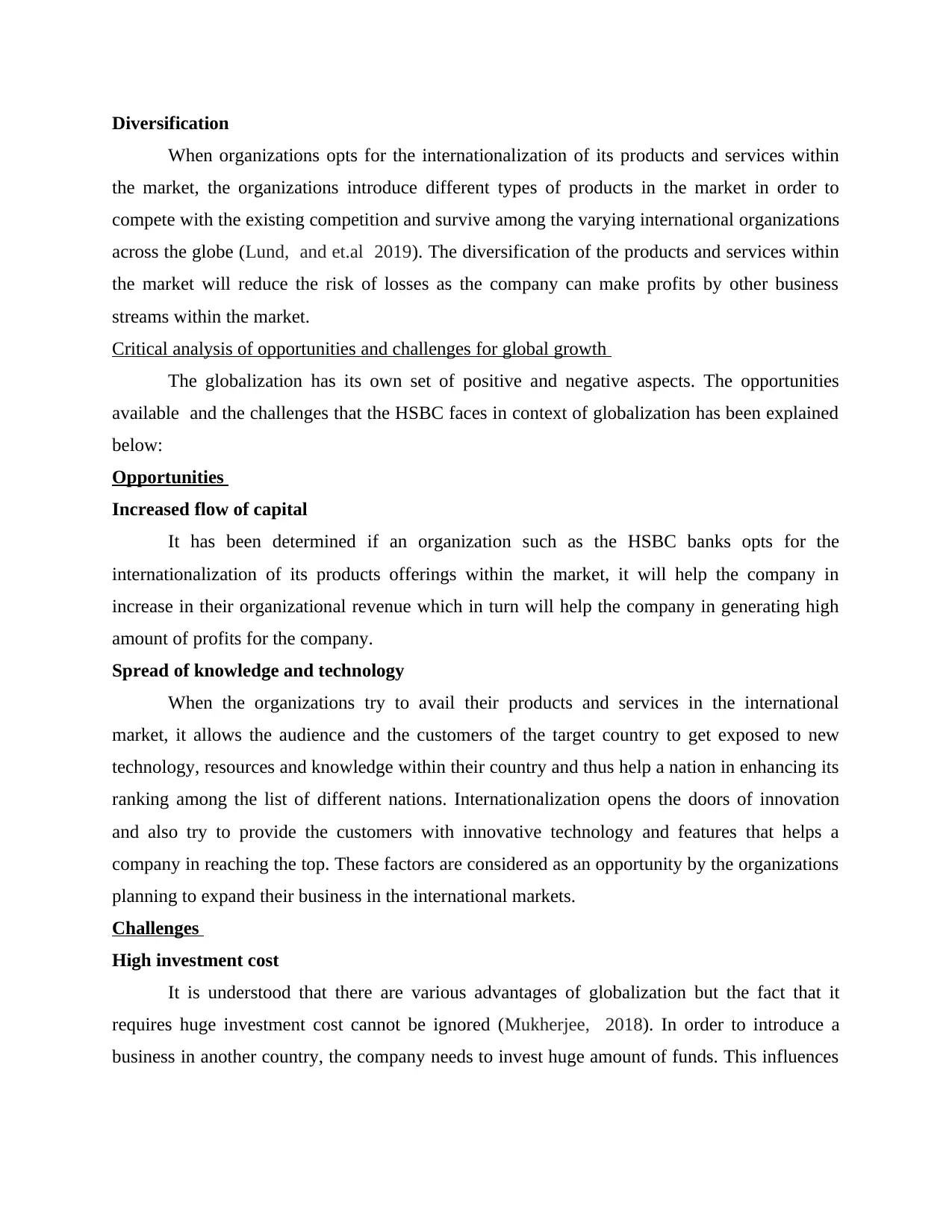
Diversification
When organizations opts for the internationalization of its products and services within
the market, the organizations introduce different types of products in the market in order to
compete with the existing competition and survive among the varying international organizations
across the globe (Lund, and et.al 2019). The diversification of the products and services within
the market will reduce the risk of losses as the company can make profits by other business
streams within the market.
Critical analysis of opportunities and challenges for global growth
The globalization has its own set of positive and negative aspects. The opportunities
available and the challenges that the HSBC faces in context of globalization has been explained
below:
Opportunities
Increased flow of capital
It has been determined if an organization such as the HSBC banks opts for the
internationalization of its products offerings within the market, it will help the company in
increase in their organizational revenue which in turn will help the company in generating high
amount of profits for the company.
Spread of knowledge and technology
When the organizations try to avail their products and services in the international
market, it allows the audience and the customers of the target country to get exposed to new
technology, resources and knowledge within their country and thus help a nation in enhancing its
ranking among the list of different nations. Internationalization opens the doors of innovation
and also try to provide the customers with innovative technology and features that helps a
company in reaching the top. These factors are considered as an opportunity by the organizations
planning to expand their business in the international markets.
Challenges
High investment cost
It is understood that there are various advantages of globalization but the fact that it
requires huge investment cost cannot be ignored (Mukherjee, 2018). In order to introduce a
business in another country, the company needs to invest huge amount of funds. This influences
When organizations opts for the internationalization of its products and services within
the market, the organizations introduce different types of products in the market in order to
compete with the existing competition and survive among the varying international organizations
across the globe (Lund, and et.al 2019). The diversification of the products and services within
the market will reduce the risk of losses as the company can make profits by other business
streams within the market.
Critical analysis of opportunities and challenges for global growth
The globalization has its own set of positive and negative aspects. The opportunities
available and the challenges that the HSBC faces in context of globalization has been explained
below:
Opportunities
Increased flow of capital
It has been determined if an organization such as the HSBC banks opts for the
internationalization of its products offerings within the market, it will help the company in
increase in their organizational revenue which in turn will help the company in generating high
amount of profits for the company.
Spread of knowledge and technology
When the organizations try to avail their products and services in the international
market, it allows the audience and the customers of the target country to get exposed to new
technology, resources and knowledge within their country and thus help a nation in enhancing its
ranking among the list of different nations. Internationalization opens the doors of innovation
and also try to provide the customers with innovative technology and features that helps a
company in reaching the top. These factors are considered as an opportunity by the organizations
planning to expand their business in the international markets.
Challenges
High investment cost
It is understood that there are various advantages of globalization but the fact that it
requires huge investment cost cannot be ignored (Mukherjee, 2018). In order to introduce a
business in another country, the company needs to invest huge amount of funds. This influences
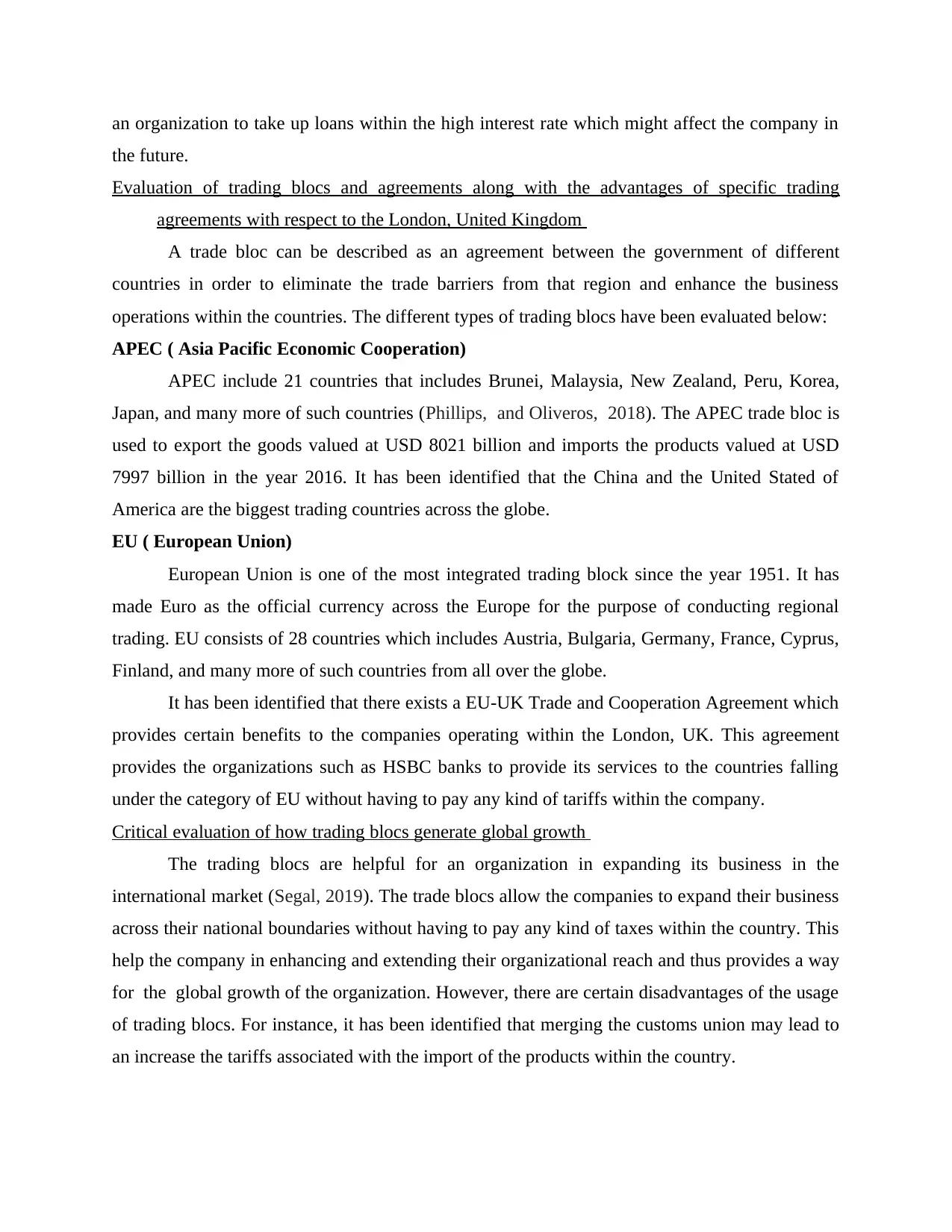
an organization to take up loans within the high interest rate which might affect the company in
the future.
Evaluation of trading blocs and agreements along with the advantages of specific trading
agreements with respect to the London, United Kingdom
A trade bloc can be described as an agreement between the government of different
countries in order to eliminate the trade barriers from that region and enhance the business
operations within the countries. The different types of trading blocs have been evaluated below:
APEC ( Asia Pacific Economic Cooperation)
APEC include 21 countries that includes Brunei, Malaysia, New Zealand, Peru, Korea,
Japan, and many more of such countries (Phillips, and Oliveros, 2018). The APEC trade bloc is
used to export the goods valued at USD 8021 billion and imports the products valued at USD
7997 billion in the year 2016. It has been identified that the China and the United Stated of
America are the biggest trading countries across the globe.
EU ( European Union)
European Union is one of the most integrated trading block since the year 1951. It has
made Euro as the official currency across the Europe for the purpose of conducting regional
trading. EU consists of 28 countries which includes Austria, Bulgaria, Germany, France, Cyprus,
Finland, and many more of such countries from all over the globe.
It has been identified that there exists a EU-UK Trade and Cooperation Agreement which
provides certain benefits to the companies operating within the London, UK. This agreement
provides the organizations such as HSBC banks to provide its services to the countries falling
under the category of EU without having to pay any kind of tariffs within the company.
Critical evaluation of how trading blocs generate global growth
The trading blocs are helpful for an organization in expanding its business in the
international market (Segal, 2019). The trade blocs allow the companies to expand their business
across their national boundaries without having to pay any kind of taxes within the country. This
help the company in enhancing and extending their organizational reach and thus provides a way
for the global growth of the organization. However, there are certain disadvantages of the usage
of trading blocs. For instance, it has been identified that merging the customs union may lead to
an increase the tariffs associated with the import of the products within the country.
the future.
Evaluation of trading blocs and agreements along with the advantages of specific trading
agreements with respect to the London, United Kingdom
A trade bloc can be described as an agreement between the government of different
countries in order to eliminate the trade barriers from that region and enhance the business
operations within the countries. The different types of trading blocs have been evaluated below:
APEC ( Asia Pacific Economic Cooperation)
APEC include 21 countries that includes Brunei, Malaysia, New Zealand, Peru, Korea,
Japan, and many more of such countries (Phillips, and Oliveros, 2018). The APEC trade bloc is
used to export the goods valued at USD 8021 billion and imports the products valued at USD
7997 billion in the year 2016. It has been identified that the China and the United Stated of
America are the biggest trading countries across the globe.
EU ( European Union)
European Union is one of the most integrated trading block since the year 1951. It has
made Euro as the official currency across the Europe for the purpose of conducting regional
trading. EU consists of 28 countries which includes Austria, Bulgaria, Germany, France, Cyprus,
Finland, and many more of such countries from all over the globe.
It has been identified that there exists a EU-UK Trade and Cooperation Agreement which
provides certain benefits to the companies operating within the London, UK. This agreement
provides the organizations such as HSBC banks to provide its services to the countries falling
under the category of EU without having to pay any kind of tariffs within the company.
Critical evaluation of how trading blocs generate global growth
The trading blocs are helpful for an organization in expanding its business in the
international market (Segal, 2019). The trade blocs allow the companies to expand their business
across their national boundaries without having to pay any kind of taxes within the country. This
help the company in enhancing and extending their organizational reach and thus provides a way
for the global growth of the organization. However, there are certain disadvantages of the usage
of trading blocs. For instance, it has been identified that merging the customs union may lead to
an increase the tariffs associated with the import of the products within the country.
⊘ This is a preview!⊘
Do you want full access?
Subscribe today to unlock all pages.

Trusted by 1+ million students worldwide
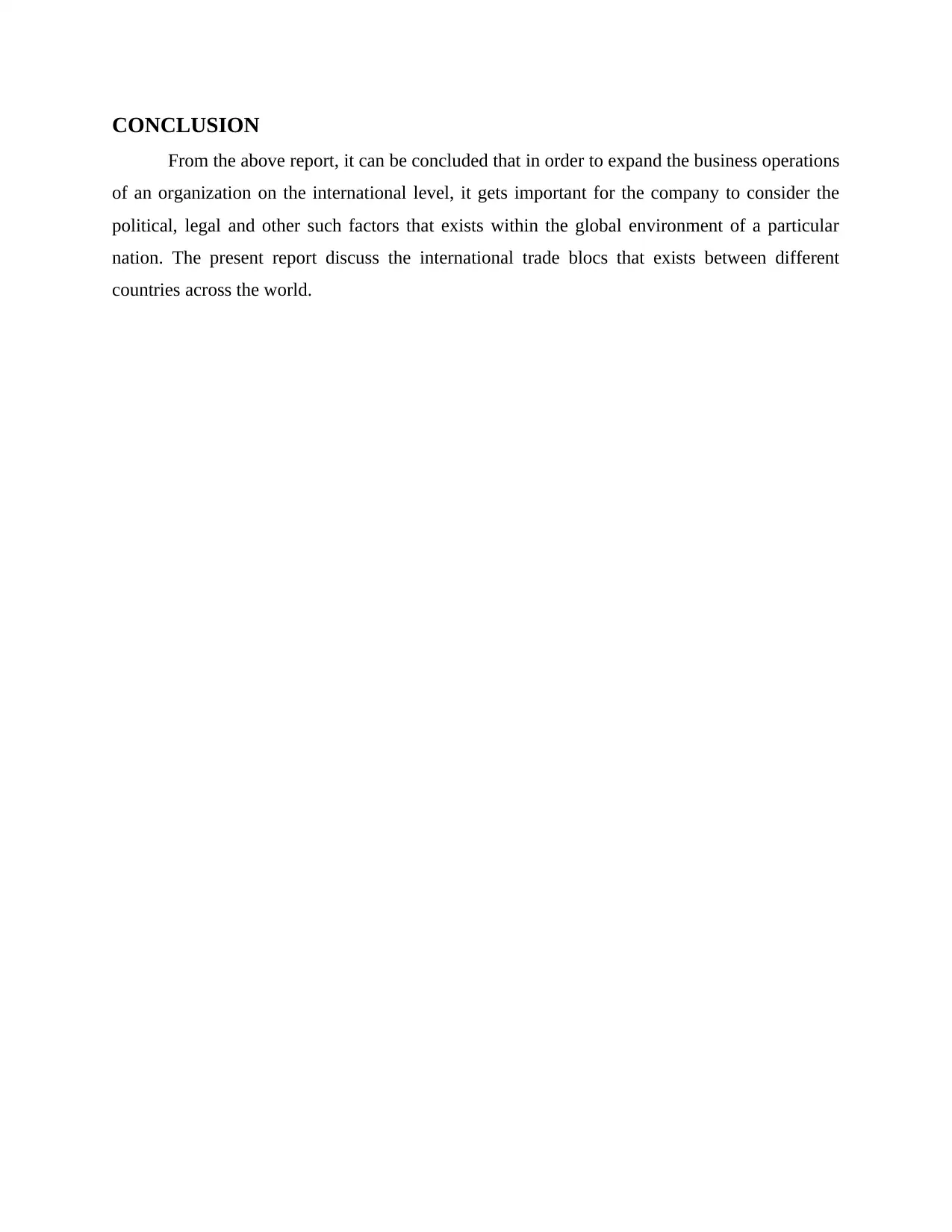
CONCLUSION
From the above report, it can be concluded that in order to expand the business operations
of an organization on the international level, it gets important for the company to consider the
political, legal and other such factors that exists within the global environment of a particular
nation. The present report discuss the international trade blocs that exists between different
countries across the world.
From the above report, it can be concluded that in order to expand the business operations
of an organization on the international level, it gets important for the company to consider the
political, legal and other such factors that exists within the global environment of a particular
nation. The present report discuss the international trade blocs that exists between different
countries across the world.
Paraphrase This Document
Need a fresh take? Get an instant paraphrase of this document with our AI Paraphraser
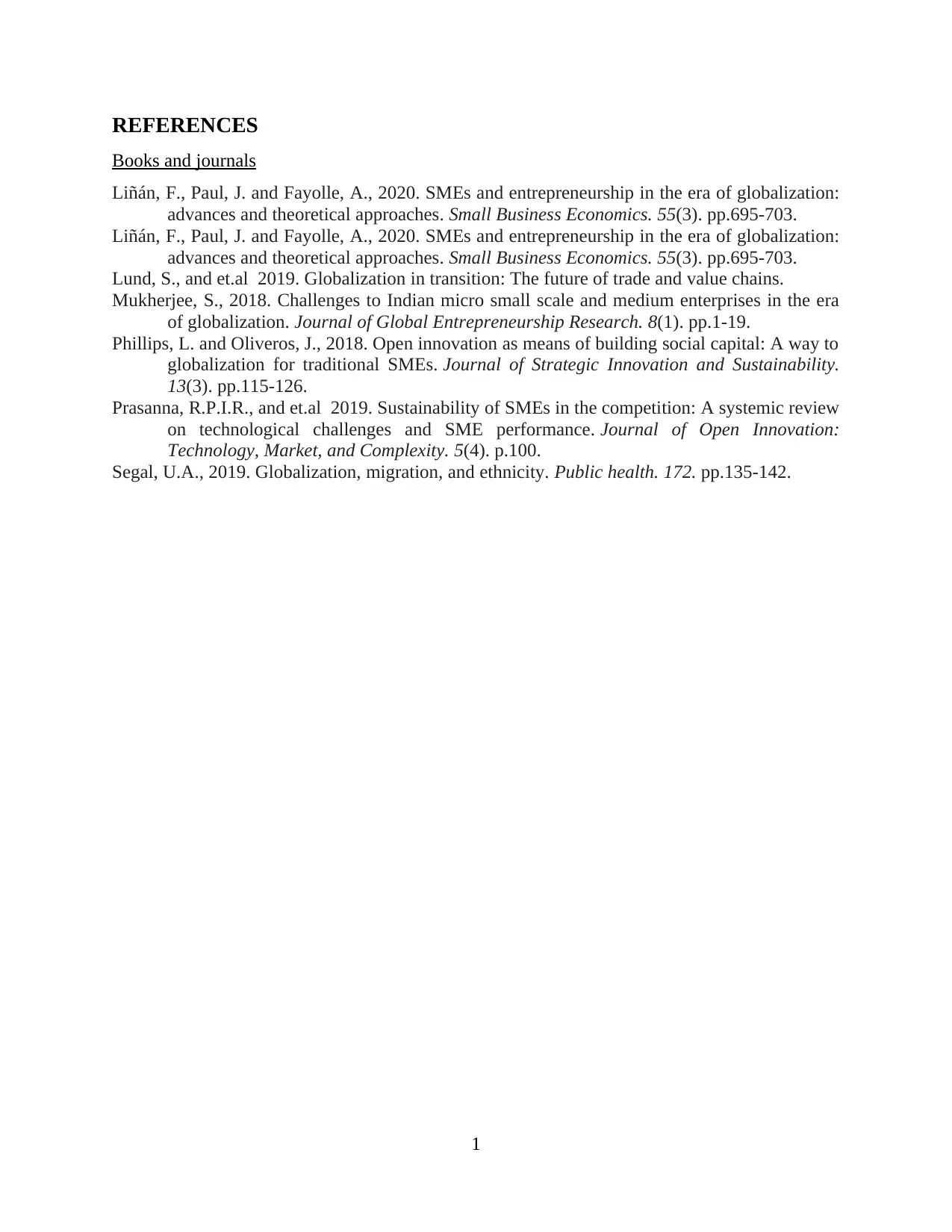
REFERENCES
Books and journals
Liñán, F., Paul, J. and Fayolle, A., 2020. SMEs and entrepreneurship in the era of globalization:
advances and theoretical approaches. Small Business Economics. 55(3). pp.695-703.
Liñán, F., Paul, J. and Fayolle, A., 2020. SMEs and entrepreneurship in the era of globalization:
advances and theoretical approaches. Small Business Economics. 55(3). pp.695-703.
Lund, S., and et.al 2019. Globalization in transition: The future of trade and value chains.
Mukherjee, S., 2018. Challenges to Indian micro small scale and medium enterprises in the era
of globalization. Journal of Global Entrepreneurship Research. 8(1). pp.1-19.
Phillips, L. and Oliveros, J., 2018. Open innovation as means of building social capital: A way to
globalization for traditional SMEs. Journal of Strategic Innovation and Sustainability.
13(3). pp.115-126.
Prasanna, R.P.I.R., and et.al 2019. Sustainability of SMEs in the competition: A systemic review
on technological challenges and SME performance. Journal of Open Innovation:
Technology, Market, and Complexity. 5(4). p.100.
Segal, U.A., 2019. Globalization, migration, and ethnicity. Public health. 172. pp.135-142.
1
Books and journals
Liñán, F., Paul, J. and Fayolle, A., 2020. SMEs and entrepreneurship in the era of globalization:
advances and theoretical approaches. Small Business Economics. 55(3). pp.695-703.
Liñán, F., Paul, J. and Fayolle, A., 2020. SMEs and entrepreneurship in the era of globalization:
advances and theoretical approaches. Small Business Economics. 55(3). pp.695-703.
Lund, S., and et.al 2019. Globalization in transition: The future of trade and value chains.
Mukherjee, S., 2018. Challenges to Indian micro small scale and medium enterprises in the era
of globalization. Journal of Global Entrepreneurship Research. 8(1). pp.1-19.
Phillips, L. and Oliveros, J., 2018. Open innovation as means of building social capital: A way to
globalization for traditional SMEs. Journal of Strategic Innovation and Sustainability.
13(3). pp.115-126.
Prasanna, R.P.I.R., and et.al 2019. Sustainability of SMEs in the competition: A systemic review
on technological challenges and SME performance. Journal of Open Innovation:
Technology, Market, and Complexity. 5(4). p.100.
Segal, U.A., 2019. Globalization, migration, and ethnicity. Public health. 172. pp.135-142.
1
1 out of 8
Related Documents
Your All-in-One AI-Powered Toolkit for Academic Success.
+13062052269
info@desklib.com
Available 24*7 on WhatsApp / Email
![[object Object]](/_next/static/media/star-bottom.7253800d.svg)
Unlock your academic potential
Copyright © 2020–2026 A2Z Services. All Rights Reserved. Developed and managed by ZUCOL.




